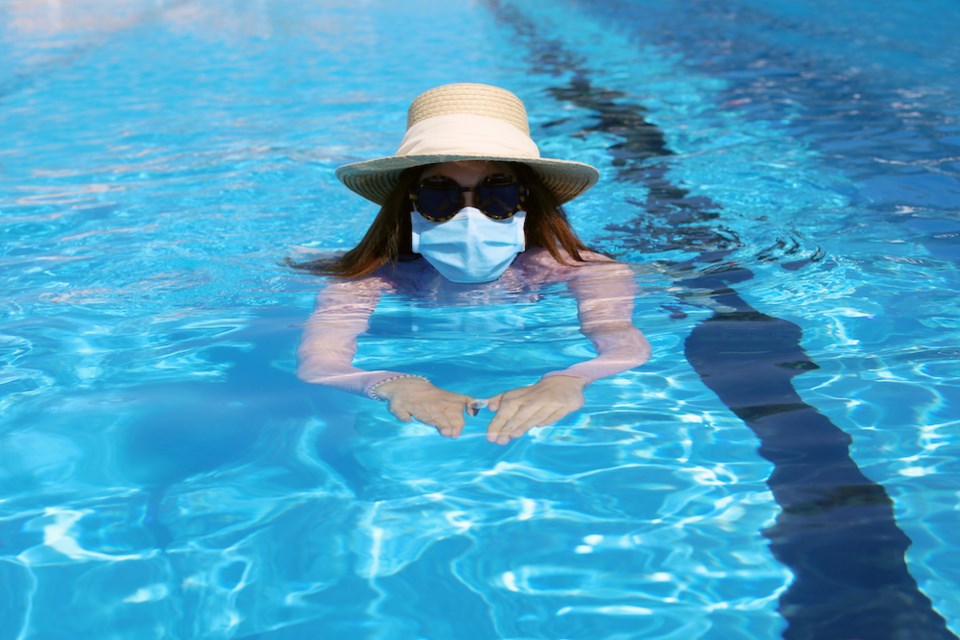Will the sun's rays slow the spread of COVID-19? Can you catch the virus in swimming pools?
There are countless myths circulating on social media about COVID-19, but some of them gain significantly more traction than others. And while some of them may seem harmless, others are dangerous, like when in 2020 an alarming number of people drank bleach in an attempt to kill the virus after misinformation .
In an effort to dispel harmful beliefs about COVID-19, UBC professor Dr. Anny Blakney uses TikTok to provide correct information about everything from vaccines to transmission and beyond.
Did Joe Rohan become a medical doctor while we weren’t looking?
Blakney is an assistant professor in UBC’s Michael Smith Laboratories and school of biomedical engineering. She came to UBC in January from Imperial College London, where she worked on a COVID-19 vaccine based on the self-amplifying RNA platform. This vaccine technology is similar to those used by Pfizer/BioNTech and Moderna, except it is able to replicate itself in cells so patients can receive a lower dose.
Blakney told Vancouver Is Awesome that was started by the UN Verified Initiative and the Vaccine Confidence Project. The idea was to connect scientists and clinicians to work on COVID-19 with the general public to explain how they make and test vaccines as well as answer questions.
“It may seem like a silly idea but it’s actually turned out to be a powerful way to show people what I do in the lab and answer any questions they may have about vaccines,” says Blakney.
"I think a lot of people don't know what it looks like to make a vaccine--but seeing is believing."
By being open and not judging anyone's hesitation to vaccines, Blakney says the platform has been a powerful tool to engage with a large audience.
Pretty sus.
Blakney addressed some popular myths about COVID-19.
Myth #1: Warmer weather slows down COVID-19 transmission.
Blakney said that "the best evidence suggests warm weather does not affect the actual coronavirus," but the summer months compel more people to spend time outdoors where there’s less transmission compared to inside. "So in theory, there should be less transmission in the spring and summer."
That said, people should continue to follow public health guidelines while outside—keep physically distanced, wear a mask and wash your hands often.
"COVID-19 is a respiratory infection spread by breathing—there’s no conclusive evidence on whether or not the outside temperature directly affects transmission," she explained.
Myth #2: You can catch COVID-19 in swimming pools via water transmission.
"COVID-19 is a respiratory disease that spreads in the air. The best available evidence strongly suggests that when virus particles hit chlorinated water, like in most swimming pools, the particles are no longer infectious," said Blakney.
Myth #3: Vitamin and mineral supplements prevent and cure COVID-19.
While proper nutrition is very important to keep your immune system healthy, it won't cure coronavirus. Blakney noted that a healthy lifestyle complete with "vitamins and minerals will remain an important part of your recovery, but they won’t act as a cure."
Myth #4: Mosquitoes, ticks and fleas can carry and transmit COVID-19.
"Mosquitoes, ticks and fleas transmit disease through their bite to your bloodstream. Because COVID-19 is not a blood-borne virus, there’s no evidence it can be spread by mosquitos, ticks and fleas," explained Blakney.
Myth #5: After getting the vaccine, we won’t need masks anymore.
Since the majority of Canadians have only received their first dose of vaccine, it is still possible to infect someone who isn't vaccinated. The need for wearing face masks will decline once more of the population has been vaccinated, explained Blakney.
"While the vaccines have been shown to reduce transmission, they are not 100 per cent effective at reducing transmission altogether," she said.
Myth #6: I’ve had COVID-19 so I don’t need to get vaccinated.
Blakney noted that past COVID-19 infection will give people some "level of immunity in the future." However, the vaccine offers a much "higher" immunity level.
"Also, no vaccine is perfect—there’s still a chance you could contract COVID-19. But if you’re vaccinated, it will help prevent serious illness and the vaccines are very effective at preventing hospitalization due to COVID-19," she explained.




